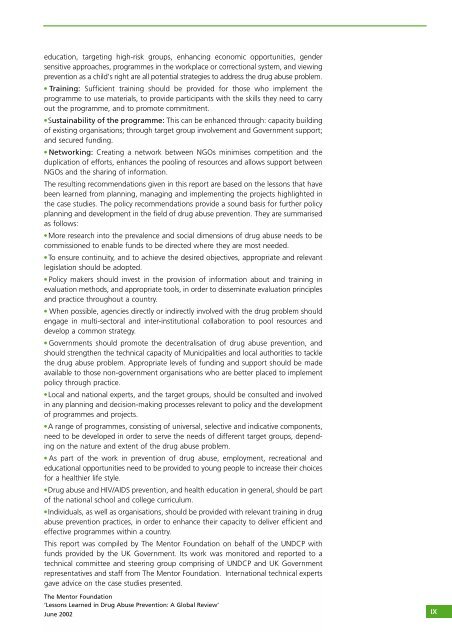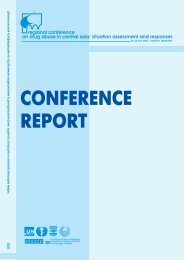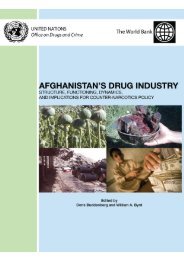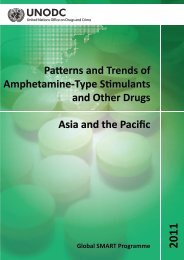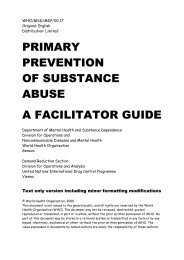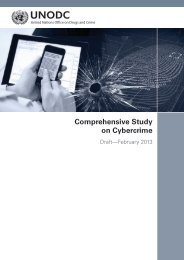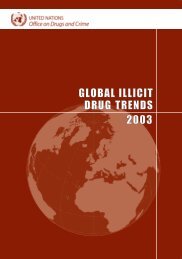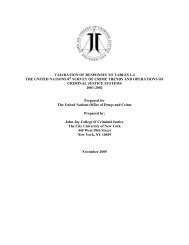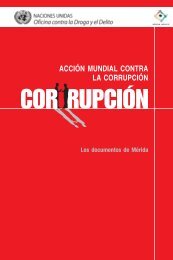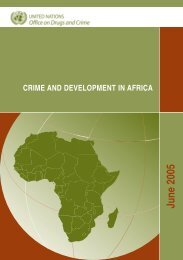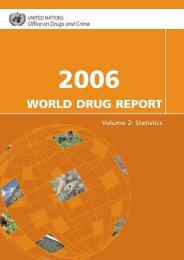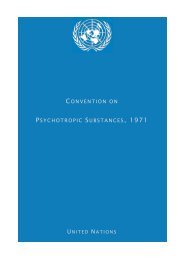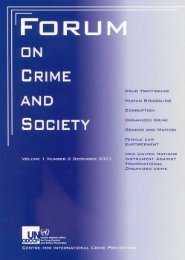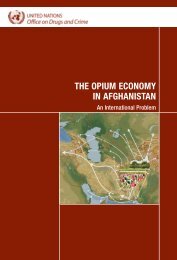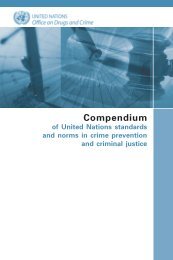PDF (Lessons learned in drug abuse prevention: a global review)
PDF (Lessons learned in drug abuse prevention: a global review)
PDF (Lessons learned in drug abuse prevention: a global review)
Create successful ePaper yourself
Turn your PDF publications into a flip-book with our unique Google optimized e-Paper software.
education, target<strong>in</strong>g high-risk groups, enhanc<strong>in</strong>g economic opportunities, gender<br />
sensitive approaches, programmes <strong>in</strong> the workplace or correctional system, and view<strong>in</strong>g<br />
<strong>prevention</strong> as a child's right are all potential strategies to address the <strong>drug</strong> <strong>abuse</strong> problem.<br />
● Tra<strong>in</strong><strong>in</strong>g: Sufficient tra<strong>in</strong><strong>in</strong>g should be provided for those who implement the<br />
programme to use materials, to provide participants with the skills they need to carry<br />
out the programme, and to promote commitment.<br />
● Susta<strong>in</strong>ability of the programme: This can be enhanced through: capacity build<strong>in</strong>g<br />
of exist<strong>in</strong>g organisations; through target group <strong>in</strong>volvement and Government support;<br />
and secured fund<strong>in</strong>g.<br />
● Network<strong>in</strong>g: Creat<strong>in</strong>g a network between NGOs m<strong>in</strong>imises competition and the<br />
duplication of efforts, enhances the pool<strong>in</strong>g of resources and allows support between<br />
NGOs and the shar<strong>in</strong>g of <strong>in</strong>formation.<br />
The result<strong>in</strong>g recommendations given <strong>in</strong> this report are based on the lessons that have<br />
been <strong>learned</strong> from plann<strong>in</strong>g, manag<strong>in</strong>g and implement<strong>in</strong>g the projects highlighted <strong>in</strong><br />
the case studies. The policy recommendations provide a sound basis for further policy<br />
plann<strong>in</strong>g and development <strong>in</strong> the field of <strong>drug</strong> <strong>abuse</strong> <strong>prevention</strong>. They are summarised<br />
as follows:<br />
● More research <strong>in</strong>to the prevalence and social dimensions of <strong>drug</strong> <strong>abuse</strong> needs to be<br />
commissioned to enable funds to be directed where they are most needed.<br />
● To ensure cont<strong>in</strong>uity, and to achieve the desired objectives, appropriate and relevant<br />
legislation should be adopted.<br />
● Policy makers should <strong>in</strong>vest <strong>in</strong> the provision of <strong>in</strong>formation about and tra<strong>in</strong><strong>in</strong>g <strong>in</strong><br />
evaluation methods, and appropriate tools, <strong>in</strong> order to dissem<strong>in</strong>ate evaluation pr<strong>in</strong>ciples<br />
and practice throughout a country.<br />
● When possible, agencies directly or <strong>in</strong>directly <strong>in</strong>volved with the <strong>drug</strong> problem should<br />
engage <strong>in</strong> multi-sectoral and <strong>in</strong>ter-<strong>in</strong>stitutional collaboration to pool resources and<br />
develop a common strategy.<br />
● Governments should promote the decentralisation of <strong>drug</strong> <strong>abuse</strong> <strong>prevention</strong>, and<br />
should strengthen the technical capacity of Municipalities and local authorities to tackle<br />
the <strong>drug</strong> <strong>abuse</strong> problem. Appropriate levels of fund<strong>in</strong>g and support should be made<br />
available to those non-government organisations who are better placed to implement<br />
policy through practice.<br />
● Local and national experts, and the target groups, should be consulted and <strong>in</strong>volved<br />
<strong>in</strong> any plann<strong>in</strong>g and decision-mak<strong>in</strong>g processes relevant to policy and the development<br />
of programmes and projects.<br />
● A range of programmes, consist<strong>in</strong>g of universal, selective and <strong>in</strong>dicative components,<br />
need to be developed <strong>in</strong> order to serve the needs of different target groups, depend<strong>in</strong>g<br />
on the nature and extent of the <strong>drug</strong> <strong>abuse</strong> problem.<br />
● As part of the work <strong>in</strong> <strong>prevention</strong> of <strong>drug</strong> <strong>abuse</strong>, employment, recreational and<br />
educational opportunities need to be provided to young people to <strong>in</strong>crease their choices<br />
for a healthier life style.<br />
● Drug <strong>abuse</strong> and HIV/AIDS <strong>prevention</strong>, and health education <strong>in</strong> general, should be part<br />
of the national school and college curriculum.<br />
● Individuals, as well as organisations, should be provided with relevant tra<strong>in</strong><strong>in</strong>g <strong>in</strong> <strong>drug</strong><br />
<strong>abuse</strong> <strong>prevention</strong> practices, <strong>in</strong> order to enhance their capacity to deliver efficient and<br />
effective programmes with<strong>in</strong> a country.<br />
This report was compiled by The Mentor Foundation on behalf of the UNDCP with<br />
funds provided by the UK Government. Its work was monitored and reported to a<br />
technical committee and steer<strong>in</strong>g group compris<strong>in</strong>g of UNDCP and UK Government<br />
representatives and staff from The Mentor Foundation. International technical experts<br />
gave advice on the case studies presented.<br />
The Mentor Foundation<br />
‘<strong>Lessons</strong> Learned <strong>in</strong> Drug Abuse Prevention: A Global Review’<br />
June 2002<br />
IX


